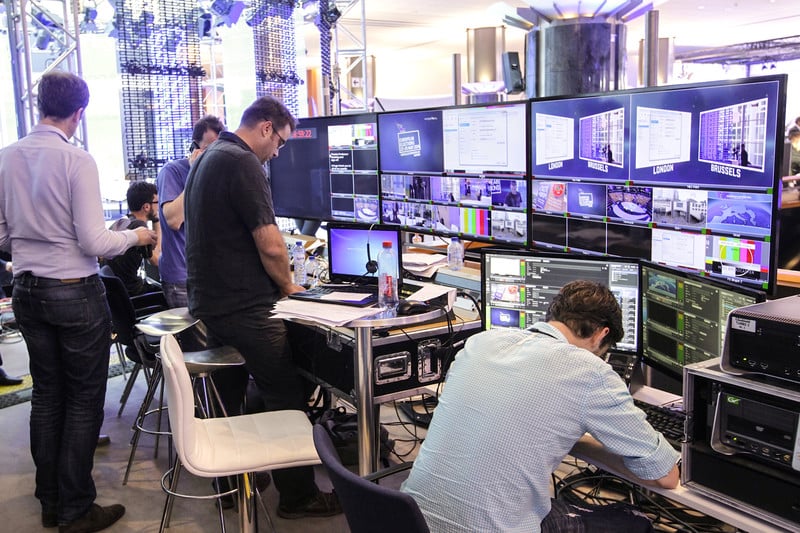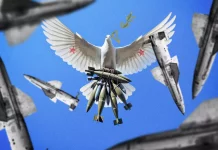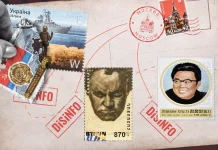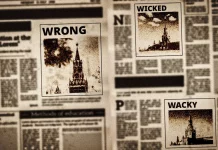
EU institutions aim to counter Russian propaganda with “positive” messages, media funding, and closer regulation, a new action plan says.
The plan, a nine-page paper drafted by the EU foreign service and seen by EUobserver, will be discussed by ministers at a general affairs council on Tuesday (23 June), with a view to adoption by leaders on Thursday.
It notes that Russia’s “use and misuse of communication tools” has “played an important role in the dramatic political, economic, and security-related developments” in the EU’s eastern neighbourhood in the past 18 months.
It calls for “promotion of EU policies” in former Soviet states, support for “independent media”, and “increased public awareness of disinformation activities by external actors”.
It says a new EU foreign service cell, called East StratComTeam, which is to be up-and-running by September, will shepherd activity.
It’s to “develop dedicated communication material on priority issues”, which will be “put at the disposal of the EU’s political leadership, press services, EU delegations, and EU member states”.
It notes the material, to be circulated in Russian and in local languages, should “allow citizens to easily understand that political and economic reforms promoted by the EU can, over time, have a positive impact on their daily lives”.
It says that “rather than explain the detail of EU policies and programmes, [it] should clearly explain their benefits to the people of the region … in clear language, and based on real-life success stories that will resonate”.
EU institutions will also work with NGOs “to raise awareness of [Russian] disinformation activities amongst the general public”.
They will tap the so-called Open budget line in 2015 to 2020 for “targeted training and capacity building of journalists and media actors” in countries such as Georgia, Moldova, and Ukraine.
On the regulation front, the EU foreign service notes that “media policy remains primarily a national competence”.
But with some Russian media, such as RT or Sputnik, broadcasting fabrications and hate speech from their bureaus in EU cities, it says “the EU … will work to improve co-operation between national regulators, including through meetings of the European Regulators Group”, an audiovisual body.
It also says the European Commission will “table a new legislative proposal to improve the regulatory environment and take account of current challenges”.
The plan is the fruit of three months’ reflection by the EU diplomatic corps.
It was circulated to EU ambassadors on 16 June.
A diplomat from one northern EU member state described it as a “pragmatic, low-level approach”. He noted that “the action plan is a living document, which can be expanded later”.
Diplomats from former Iron Curtain EU countries, many of which see Russian propaganda as an immediate threat, have ridiculed it.
One contact told EUobserver: “It’s weak. We hope the ministers will strengthen it when they meet on Tuesday”. A second contact said: “It’s a piece of crap”.
UK perspective
By comparison, the UK, in April, created a 1,500-man unit in the British army, the so-called 77th Brigade, to engage in psychological operations.
It will focus on social media, targeting Russian and Islamic State propaganda.
But for his part, Daniel Korski, an advisor to British PM David Cameron, who used to work for the EU foreign service, said effective communication doesn’t need more officials in the small East StratComTeam.
“It’s much less to do with funding new institutions or schemes. It’s more about rapid reaction by politicians and institutions, so that when a statement is blatantly false, we’re quick to debunk it and to say what we stand for”, he told Globsec, a security congress in Slovakia last weekend.
Korski, who worked on British PM David Cameron’s election campaign, noted that EU states already have adequate infrastructure.
“We already have structures which are capable of reacting very quickly to media developments, of debunking negative messages: Tthey’re called political parties”, he said.
Gloves off
Robert Pszczel, Nato’s former spokesman in Moscow, told Globsec the EU should “take off the gloves”.
“We have to talk back. It doesn’t mean we engage with Russian propaganda tit for tat … but we have to talk back because silence is interpreted in the wrong way”.
He said Russian VIPs are prone to self-contradiction and hollow arguments.
“I’d like to see Western media invite more Russian officials on talk shows. I’d like to see them take on people like Chizhov [Russia’s EU ambassador] or Churkin [its UN ambassador] because they’ll win”, he noted.
“They contradict themselves: One minute it’s ‘gay EU’ and ‘Nato is a paper tiger’. The next minute it’s ‘neo-Nazi EU’ and ‘Nato is a terrible menace’.”
He gave his own TV clash with Russian nationalist MP Vladimir Zhirinovsky as an example.
“If Mr Zhirinovsky says: ‘We [Russia] have nukes, so, aaargh!’, it’s easy to say: ‘Well, we [Nato countries] have nukes as well’. It made him keep quiet for a while”.
By Andrew Rettman, EUobserver





